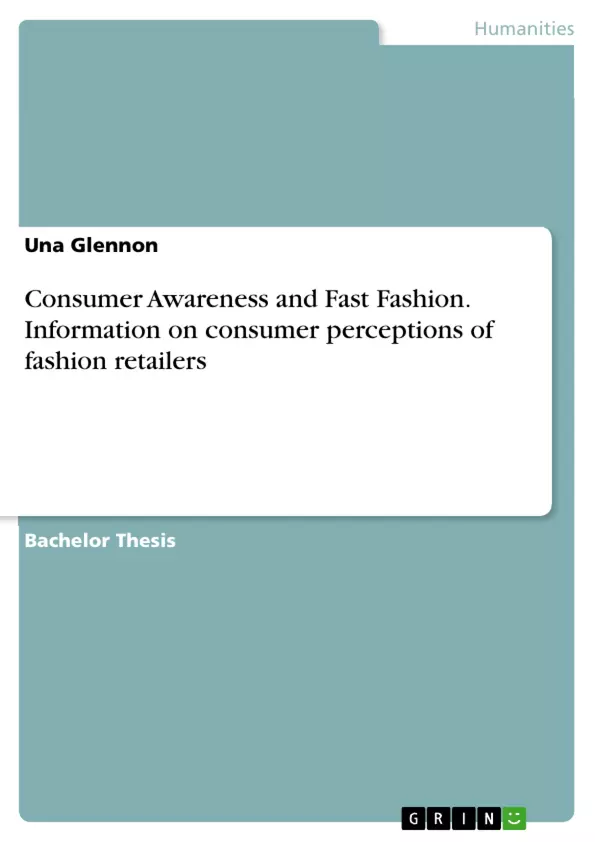This research project explores the consumer awareness of fast fashion amongst Irish consumers aged between eighteen and twentyfive. The aim of this research is to explore the level of awareness consumers have regarding fast fashion. Additionally, it intends to explore what the term “Fast fashion” means to young Irish consumers. Furthermore, this research aims to provide information on consumer perceptions of fashion retailers. Moreover, the research also intends to highlight whether those perceptions play a role in the buyer decision process.
The key findings suggest that consumers fail to associate the ethical and environmental concerns that are synonymous with the fast fashion industry. Moreover, the research also exposed a failure that there is a disconnect between the term fast fashion and the manufacturing methods. Fast fashion and sweatshop labour are not mutually exclusive terms yet fast fashion as a term does not seem to carry the burden of its manufacturing origin. It was found that consumers have intentions of shopping more ethically and sustainably. However, there appears to be several misconceptions in what is currently considered ethical fashion among consumers which would affect the consumers ability to make an informed purchase decision. Cognitive dissonance being the act of consumers distancing themselves from purchase decisions that contradict their morals to avoid the feeling of discomfort was evident in this study. This research also found that the practice of greenwashing was present in fast fashion retailers advertising which does not portray the true environmental and social impacts of a product to the consumer.
Table of Contents
- Abstract
- Chapter 1: Introduction
- 1.1 Background
- 1.2 Rationale and research question
- 1.3 Research and methodology
- 1.4 Research Aims
- 1.5 Research Objectives
- Chapter 2: Literature Review
- 2.1 Ethical Practices of Manufacturing Companies
- 2.1.1 Bangladesh
- 2.2 Working Conditions and Labour Rights
- 2.2.1 Primark
- 2.2.2 Zara and Bershka
- 2.2.3 H&M
- 2.2.4 Boohoo and Pretty Little Thing (PLT)
- 2.2.5 Nike
- 2.2.6 Gucci
- 2.2.7 Ralph Lauren
- 2.2.8 Victoria's Secret
- 2.2.9 Louis Vuitton
- 2.3 The Psychology of Buying
- 2.3.1 Psychodynamic Theory
- 2.3.2 Cognitive Dissonance Theory
- 2.4 Fast Fashion
- 2.5 Consumer Consciousness and Marketing Techniques
- 2.6 Conclusion
- 2.1 Ethical Practices of Manufacturing Companies
- Chapter 3: Methodology
- 3.1 Introduction
- 3.2 Research Question
- 3.3 Research Paradigm
- 3.4 Research design
- 3.4.1 Demographics
- 3.4.2 Opinions
- 3.4.3 Values
- 3.5 Research Sample
- 3.6 Data Collection
- 3.7 Data analysis
- 3.8 Ethical Underpinnings
- 3.9 Methodology Limitations
- 3.10 Conclusion
- Chapter 4: Data Display
- 4.1 Demographics
- 4.2 Perceptions and Understandings
- 4.3 Opinions
- 4.4 Conclusion
- Chapter 5: Data Discussion and Findings
- 5.1 Ethics
- 5.2 Environment
- 5.3 Consumer perceptions and misconceptions
- 5.4 Buyer Psychology
- 5.5 Further research topics
- 5.6 Conclusion
- Chapter 6: Conclusions and Recommendations
- 6.1 Introduction
- 6.2 Summary of main findings
- 6.3 Recommendations
- 6.3.1 Unethical fashion
- 6.3.2 Highlight environmental impacts
- 6.3.3 Luxury does not mean ethical
- 6.4 Limitations of the study
- 6.5 Personal Reflection
Objectives and Key Themes
This research project explores consumer awareness of ethical issues surrounding fast fashion, aiming to understand the complexities of consumer behavior and the role of marketing techniques in shaping perceptions.
- Ethical practices of fast fashion manufacturing companies
- Working conditions and labour rights in the industry
- The psychology of consumer buying behavior and its relationship to fast fashion
- Consumer consciousness and awareness of ethical concerns related to fast fashion
- Impact of marketing techniques on consumer perceptions and purchasing decisions
Chapter Summaries
Chapter 1 provides an introduction to the research, outlining the background, rationale, and methodology. It sets out the research aims and objectives, establishing the scope of the study. Chapter 2 delves into a comprehensive literature review, examining the ethical practices of fast fashion manufacturers, particularly in Bangladesh, and exploring working conditions and labor rights in the industry. The chapter also investigates the psychology of buying, focusing on psychodynamic and cognitive dissonance theories, and explores the concept of fast fashion and consumer consciousness. Chapter 3 details the methodology employed in the research, including the research question, paradigm, design, and data collection and analysis methods. It also discusses ethical considerations and limitations of the study. Chapter 4 presents the collected data, highlighting demographics, perceptions, and opinions on ethical fashion practices. Chapter 5 provides a detailed discussion of the findings, analyzing data related to ethics, environmental concerns, consumer perceptions, buyer psychology, and identifying further research areas.
Keywords
This research focuses on consumer awareness of ethical issues surrounding fast fashion, examining the practices of major fast fashion companies, the impact of marketing techniques, and consumer perceptions. Key concepts include ethical production, labor rights, consumer psychology, environmental impact, and sustainable fashion.
- Quote paper
- Una Glennon (Author), 2020, Consumer Awareness and Fast Fashion. Information on consumer perceptions of fashion retailers, Munich, GRIN Verlag, https://www.grin.com/document/942994



